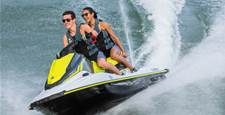Before the start of the America’s Cup, Jimmy Spithill reminisced about his team’s epic comeback four years ago – and how he didn’t want to have to do that again.
Oracle famously came from 8-1 down to take the last eight races in San Francisco and win the America’s Cup, an echo of Australia II’s 1983 triumph and one of the great knife-edge comebacks in all of sport.
“Trust me, the third time, we’re not planning on doing that,” said the Australian, who had also skippered the American boat to victory in less tense circumstances in 2010. “We’d much rather win them all at the start.”
And yet, after the first four races of the best-of-13 America’s Cup Match in Bermuda, Spithill and his team find themselves staring at a deficit. After gaining a one-point advantage for winning the challenger series a fortnight ago, Oracle watched its familiar foe, Emirates Team New Zealand, zoom – and we do mean zoom – to a sweep of the weekend’s races, and a 3-0 lead.
The New Zealanders never trailed in their wins, and their boat exhibited much greater speed than Oracle’s. The race now moves off the water – the series takes a five-day break before resuming next weekend, during which Oracle will be searching to make up the difference.
“You never stop developing the boats right up through the last race of the America’s Cup,” Spithill said. “You’ve got to have the attitude that you’re not fast enough – you’re on this endless search to keep developing the boat.”

As the designers and builders go to work, Spithill and his sailors will draw on the experience of four years ago. Spithill spoke to Inside Sport in the July edition about how the comeback came together.
“We had the choice – we were in a situation that can be negative, so how does that end? Turn it into a positive. And that was the attitude inside the team.
“Almost two weeks, to play every single day at match point. It was pretty draining, but at the end of the day, champion teams do that.”
To beat Team NZ and skipper Peter Burling – who, it has to be noted, was not at the helm in 2013 – will now require a similar effort. “We had to take a lot of risk, so there’s a very tough balance to know how much to do. Because obviously, you want to change everything, and not everything works.
“At that point, a lot of decisions had to become instinctive as opposed to the science we’re used to using.”















